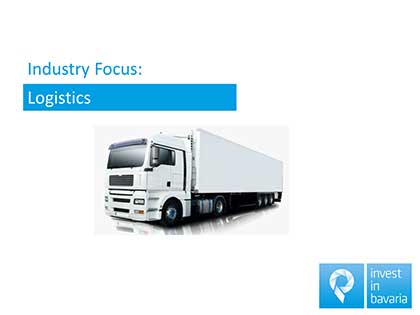Bavaria’s economic conditions are especially strong for logistics companies, given that more than 21 percent of all those working in the state are involved in processing industries, a figure well above average. From the automotive and mechanical engineering industries to medical, energy and environmental technology, the production of exports along with the demand for imports (Germany ranks third globally in both categories) are incredibly healthy for logistics companies looking to locate or expand in Europe. Bavaria’s consumer purchasing power is immense as well, which is why eight of Germany’s ten largest online retailers have their headquarters or a site in Bavaria.
The state’s logistics sector accounts for roughly 18 percent of total German sales at EUR 36 billion, and it employs more than 400,000 people. Its infrastructure consists of a model road network of 137,000 kilometers, efficient rail services and 24 ports along Europe’s most important waterway, the Rhine-Main-Danube Canal, which handles around 7.17 million tons of freight. Our two largest airports in Munich and Nuremberg turn over an additional 350,000 tons of air freight and are supported by efficient terminals and transport centers in the Bavarian cities of Augsburg, Ingolstadt, Nuremberg, Regensburg and Straubing.

Learn more about Bavaria’s economic conditions that make it a logistics powerhouse.
Download PDFNearly all large logistics companies have a presence in Bavaria: DHL, UPS, Schenker, Hellmann, Maersk, Hanjin Logistics, ProLogis and Goodman. Global headquarters based here include Dachser and DPD, while many multinationals like Amazon, Ingram Micro, Office Depot, NYK Logistics and Rexel have distribution centers in the region. Munich also hosts the annual, transport logistic, the world’s leading trade show for logistics, mobility, IT and supply chain management.
With a global reputation for efficiency and engineering excellence, it’s no surprise that Bavaria’s research institutions work with business to develop successful solutions to the challenges of logistics. Among the leaders are the Fraunhofer Center for Applied Research on Supply Chain Services, the Fraunhofer Institute for Material Flow and Logistics and the Logistik-Kompetenz-Zentrum (LKZ Prien). The industry here is in constant pursuit of innovative solutions that incorporate technology and data, offering additional opportunity for providers of IT solutions in data security, cloud computing, mobile applications and management and payment systems.
More than 20 of Bavaria’s universities and universities of applied sciences teach logistics expertise. Vocational colleges and local chambers of commerce also run many apprenticeship programs, complemented by IT training for the new economy.
Feel free to contact one of our U.S. representatives directly, or request a meeting using the form below.